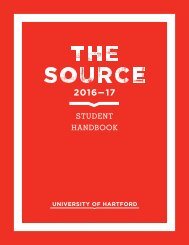advising
Create successful ePaper yourself
Turn your PDF publications into a flip-book with our unique Google optimized e-Paper software.
ADVISING HANDBOOK FOR FIRST-YEAR STUDENTS<br />
Hillyer College<br />
In Hillyer College, you develop your academic foundations while<br />
exploring and array of courses that can lead to a specialization<br />
in a future area of study. For students unsure of a major, Hillyer<br />
offers the breadth of scholarly inquiry; for students sure of their<br />
direction, Hillyer offers the depth of academic concentrations.<br />
Hillyer offers two possible associates degrees, and Associate of Arts<br />
or an Associates in Sciences, depending on a student’s interests. Our<br />
program is a structured approach for making smooth transition into<br />
a bachelor’s degree with a strong background of general education.<br />
Dual Admission<br />
Some students were admitted to the University of Hartford with<br />
dual admission status. These students were accepted both the<br />
Hillyer College and to another college. If you have dual admission<br />
status, you should work closely with your advisor to develop a<br />
program of courses suited to your area of study. Students who have<br />
dual admission status still need to meet requirements for course<br />
pre-requisites and advancement to degree candidacy. We also guide<br />
and mentor students who develop new interests while studying at<br />
Hillyer so you are not locked into choices made during the admission<br />
process.<br />
Academic Concentrations in the Associates<br />
of the Arts Program<br />
Students often discover a particular interest in a discipline or<br />
multidisciplinary area as they study in the liberal arts program at<br />
Hillyer. To personalize your program of study and begin preparing<br />
for a future specialization, you may also select and declare an<br />
academic concentration. You then become a liberal studies major<br />
with a concentration in that area of study. Academic concentrations<br />
have different requirements and will determine many of the electives<br />
you will take.<br />
The concentrations are<br />
• American Studies<br />
• Business Studies<br />
• Education Studies<br />
• Environmental Studies<br />
• Global Studies<br />
• Health Science Studies (for students interested in public policy,<br />
health care business, health care communications, etc. Students<br />
interested in medical and scientific professions should enter the<br />
Associate in Sciences degree program.)<br />
If you wish to develop a concentration in one of these areas, your<br />
advisor can help you select courses and program study.<br />
Sample Program<br />
Schedules will vary depending on degree program and with interest<br />
in a concentration.<br />
Associate of Arts<br />
First Semester, typically 16 credits<br />
ASB 110 Academic Strategies<br />
ENB 110 English Composition and Literature<br />
MAB 110 Mathematical Foundation 1<br />
or MAB 111 Mathematical Foundation 2<br />
HSB History Course<br />
(various) Social Science Course<br />
(various) Humanities Course<br />
Second Semester, typically 17 credits<br />
ASB 111 Critical Literacies<br />
ENB 111 English Composition and Literature<br />
MAB Mathematics Course<br />
HSB History Course<br />
(various) Social Science Course<br />
(various) Humanities Course<br />
Associate of Science<br />
First Semester, typically 17 credits<br />
ASB 110 Academic Strategies<br />
ENB 110 English Composition and Literature<br />
MAB 110 Mathematical Foundation 1<br />
or MAB 111 Mathematical Foundation 2<br />
BYB 210 General Biology 1<br />
or BYB 211 General Biology 2<br />
(various) Elective in Social Science, History, or Humanities<br />
(various) Elective in Social Science, History, or Humanities<br />
Second Semester, typically 16 credits<br />
ASB 111 Critical Literacies<br />
ENB 111 English Composition and Literature<br />
MAB Mathematics<br />
BYB 210 General Biology 1<br />
or BYB 211 General Biology 2<br />
CH 110 College Chemistry<br />
Academic Advising<br />
Bring this handbook with you to orientation. At orientation you will<br />
meet with a faculty advisor, who will answer any questions you have<br />
about the Hillyer curriculum and help you make your final course<br />
choices, along with the days and times of your classes. In the fall<br />
semester, all first-year students will take an “<strong>advising</strong> section” for one<br />
of your courses. Your instructor for that course will be your academic<br />
advisor throughout your Hillyer program. Your <strong>advising</strong> section will<br />
be predesignated for you, and will be identified at orientation.<br />
Selecting Electives<br />
Begin by reading the course descriptions on the following pages.<br />
Consider selecting one humanities and one social science elective.<br />
Don’t be afraid to explore: take an elective in a field you have never<br />
studied. Be flexible. Some elective classes may be filled by the time<br />
you register in advance. Therefore, you should select two alternative<br />
electives, just in case your first choices are not available. Keep in<br />
mind that most electives are offered in the spring as well as the fall<br />
46



